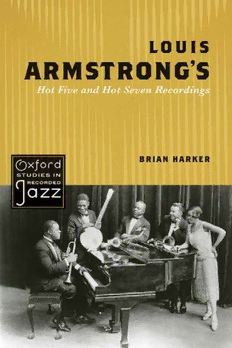
Louis Armstrong's Hot Five and Hot Seven recordings PDF
Preview Louis Armstrong's Hot Five and Hot Seven recordings
LOUIS ARMSTRONG’S HOT FIVE AND HOT SEVEN RECORDINGS OXFORD STUDIES IN RECORDED JAZZ Series Editor jeremy barham Louis Armstrong’s Hot Five and Hot Seven Recordings Brian Harker Th e Studio Recordings of the Miles Davis Quintet, 1965–68 Keith Waters LOUIS ARMSTRONG’S HOT FIVE AND HOT SEVEN RECORDINGS BRIAN HARKER 1 1 Oxford University Press, Inc., publishes works that further Oxford University’s objective of excellence in research, scholarship, and education. Oxford New York Auckland Cape Town Dar es Salaam Hong Kong Karachi Kuala Lumpur Madrid Melbourne Mexico City Nairobi New Delhi Shanghai Taipei Toronto with offices in Argentina Austria Brazil Chile Czech Republic France Greece Guatemala Hungary Italy Japan Poland Portugal Singapore South Korea Switzerland Th ailand Turkey Ukraine Vietnam Copyright © 2011 by Oxford University Press, Inc. Published by Oxford University Press, Inc. 198 Madison Avenue, New York, New York 10016 www.oup.com Oxford is a registered trademark of Oxford University Press. All rights reserved. No part of this publication may be reproduced, stored in a retrieval system, or transmitted, in any form or by any means, electronic, mechanical, photocopying, recording, or otherwise, without the prior permission of Oxford University Press. Library of Congress Cataloging-in-Publication Data Harker, Brian. Louis Armstrong’s Hot Five and Hot Seven recordings / Brian Harker. p. cm.—(Oxford studies in recorded jazz) Includes bibliographical references and index. isbn 978-0-19-538841-1; 978-0-19-538840-4 (pbk.) 1. Armstrong, Louis, 1901–1971—Criticism and interpretation. 2. Jazz—1921–1930—History and criticism. 3. Hot Five—Discography. 4. Hot Seven—Discography. I. Title. ML419.A75H37 2011 781.65092—dc22 2010019801 9 8 7 6 5 4 3 2 1 Printed in the United States of America on acid-free paper TO MY PARENTS This page intentionally left blank SERIES PREFACE the oxford studies in Recorded Jazz series off ers detailed his- torical, cultural, and technical analysis of jazz recordings across a broad spectrum of styles, periods, performing media, and nationalities. Each volume, authored by a leading scholar in the fi eld, addresses either a sin- gle jazz album or a set of related recordings by one artist/group, placing the recordings fully in their historical and musical context, and thereby enriching our understanding of their cultural and creative signifi cance. With access to the latest scholarship and with an innovative and bal- anced approach to its subject matter, the series off ers fresh perspectives on both well-known and neglected jazz repertoire. It sets out to renew musi- cal debate in jazz scholarship, and to develop the subtle critical languages and vocabularies necessary to do full justice to the complex expressive, structural, and cultural dimensions of recorded jazz performance. jeremy barham series editor This page intentionally left blank ACKNOWLEDGMENTS throughout the process of working on this book, I have benefi ted greatly from the wisdom and generosity of others. Th e fi rst debt of gratitude must go to my dissertation advisor, Mark Tucker, a great scholar and a good man who was taken from us well before his time. Mark introduced me to a way of thinking about early jazz that took seri- ously the views of those who created it without dismissing the insights of critics who approached the music from a diff erent perspective—Gunther Schuller, André Hodeir, Lawrence Gushee, and Martin Williams, among others. Th e dissertation I wrote under Mark’s direction laid the concep- tual foundation for this book. I only wish he were here to see (and help improve) the fi nal result. A fellowship from the National Endowment for the Humanities, together with grants from the Jean-Claude Baker Foundation and the School of Music and the College of Fine Arts and Communications at Brigham Young University, made it possible to conduct research in the New York City and Chicago areas. I am grateful to the many specialists and curators who guided me through their collections: Dan Morgenstern and the staff at the Institute of Jazz Studies at Rutgers University–Newark; Michael Cogswell and the staff at the Louis Armstrong House and Archives at Queens College; the staff members of the New York Public Library, Per- forming Arts Division, and the Schomburg Center for Research in Black Culture; and the staff members of the Chicago Public Library, Woodson Regional location. While investigating the realm of dance, a fi eld foreign to me, I relied heavily on a number of experts. Again, Mark Tucker pointed the way
